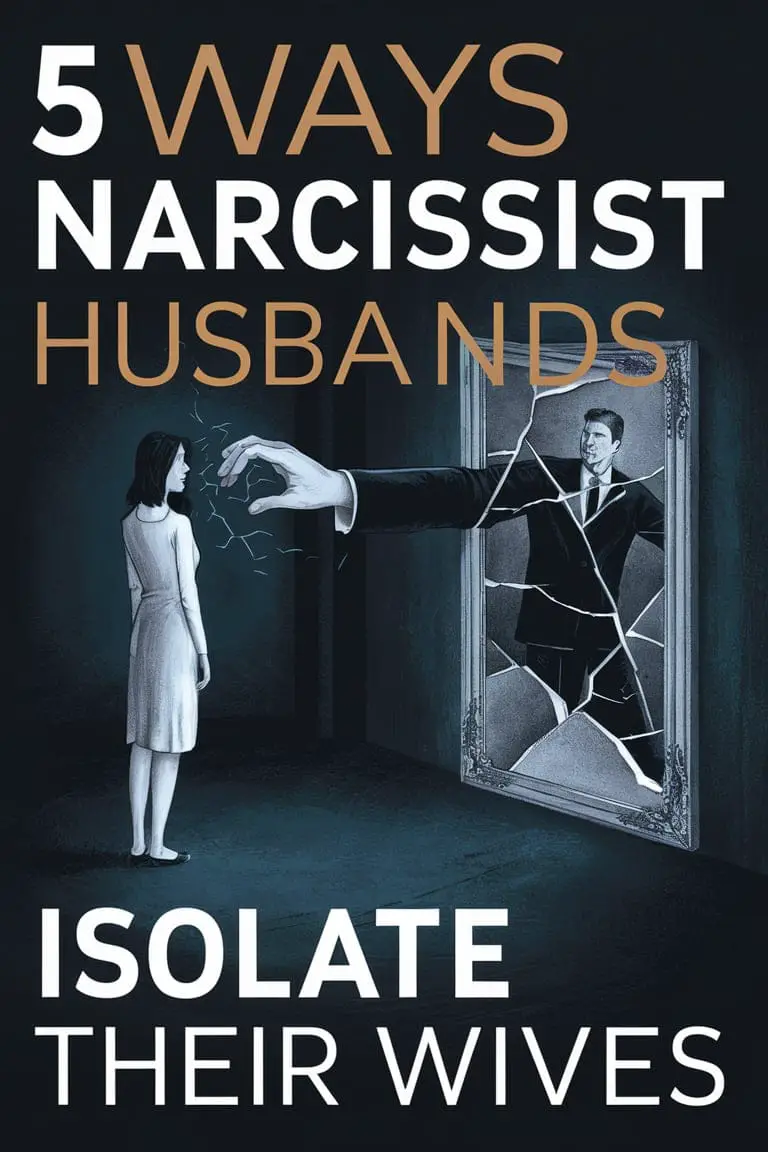Marriage, they said, is a partnership. They failed to mention what happens when one partner is determined to be the CEO, CFO, and HR department of your entire existence.
When narcissism takes up residence at home, things get a little… lonely. Not because the narcissist leaves, but because they want everyone else gone.
Here’s how narcissist husbands work their one-man isolation act, step by step.
1. Criticizing Your Friends and Family
Expect the narcissist’s review of your loved ones to make Rotten Tomatoes look generous.
He’ll start slow, maybe with a subtle, “Your mum seems a bit overbearing, don’t you think?” Suddenly, your best friend is “so negative,” your sister “jealous,” your dad “controlling” (projection, anyone?), and your entire extended family is a circus act.
Each comment chips away at your confidence in these connections.
What’s the goal here? To make you second-guess your relationships with people who actually have your back. Because if you’re busy wondering if your best mate really is toxic, you’re less likely to reach out when things get tough.
It’s not just about words, either. There are the conveniently timed arguments right before family holidays, the mysterious headaches when you’re due to catch up with old friends, and the guilt trips that could win an Oscar.
Turns out, you’re “choosing them over him”—as if having a social life is some sort of betrayal.
What to do tonight: Text the friend or relative you’ve been avoiding. “Hey, miss you—let’s catch up.” If you can’t meet in person, even a quick chat over the phone can help you remember who’s truly in your corner.
2. Guilt-Tripping and Playing the Victim
If there were an Olympic event for emotional manipulation, narcissist husbands would take gold, silver, and bronze.
Accusations fly: “You’re always out with your friends, never here for me.” Or maybe, “I guess I just don’t matter to you.” If he’s feeling especially theatrical, expect a sigh and an anguished look out the window. (Extra points if it’s raining.)
He spins every plan you make as a deliberate act against him. Girls’ night? Proof you want to escape your marriage. Dinner with your family? Clearly you value them more. Even working late can become an epic saga of abandonment.
This guilt campaign is designed to train you—Pavlov’s spouse—so that every time you consider leaving the house, you flinch. Your world shrinks to just him, because it’s easier than the emotional fallout.
What to do tonight: Notice those patterns. Write down the guilt lines he uses and how they make you feel. Awareness is your shield—when you see the script, you’re less likely to fall for it.
3. Monitoring and Controlling Communication
Phone calls, texts, social media—suddenly they’re all suspect. “Who are you messaging?” he asks, eyebrows raised. “Why did it take you ten minutes to reply?”
He may insist on checking your phone, scrolling through your messages, or even dictating who you should “unfriend” because they’re “bad news.” The relationship status isn’t “married”—it’s “under surveillance.”
Don’t even get started on social media. If you post a photo, there are questions about who liked it. If you post nothing, he wonders what you’re hiding. Every interaction, no matter how innocent, becomes an interrogation.
This isn’t about love. It’s about control. The more he inserts himself between you and the outside world, the less room you have to breathe.
What to do tonight: Change your phone password if you haven’t already. Private conversations are not crimes. If he demands access, remember: trust is a two-way street, not a police checkpoint.
4. Undermining Your Confidence
Confidence is isolation’s arch-nemesis. So, the narcissist gets to work, picking away at yours like a seagull with a packet of chips.
You get dressed up for a night out? “That’s a bit much, isn’t it?” Try something new? “You’re not really good at that.” Get a promotion at work? “I mean, it’s just luck—they probably needed to fill a quota.”
Every achievement, every joy, every hint of self-worth is met with a backhanded compliment or outright criticism.
Why? Because someone who feels strong and self-assured is more likely to reach out, build connections, and—perish the thought—notice they deserve better.
Slowly, you start to believe maybe you are “too sensitive,” “not that interesting,” or “lucky” to have him. That’s no accident. If you think lowly of yourself, you won’t expect—or seek—better treatment.
What to do tonight: Write down three things you genuinely like about yourself. Tape them to your bathroom mirror. Small steps, but defiance is built one compliment at a time.
5. Creating Drama to Keep You Off-Balance
Peaceful moments are as rare as a hen’s tooth. Drama is his natural habitat.
Notice how every time you make plans, there’s a sudden crisis? You say yes to a family dinner, he remembers a terrible slight from Aunt Brenda in 2007. You agree to go for coffee with a friend, he picks a fight over a misplaced sock.
Chaos is a tool. If you’re constantly putting out emotional fires, it’s tricky to maintain other relationships. Your friends grow tired of seeing you cancel last minute. Your family stops inviting you to events.
Eventually, it’s just easier to stay home, walking on eggshells and keeping the peace.
This isn’t a coincidence—it’s a campaign. The more isolated you get, the easier it is for him to rewrite history, gaslight you about what really happened, and keep you dependent on his version of “reality.”
What to do tonight: Notice the pattern—does drama always erupt when you have plans outside the relationship? If so, acknowledge it to yourself. Vent to a trusted friend, or even jot it down. Pattern recognition is the first step to breaking free.
Reclaiming Your World
Nothing about this is your fault.
Narcissists are experts at making their wives feel like the problem, but the only thing you’re guilty of is wanting respect, love, and a little freedom to see your mates without an inquisition.
Support exists, and you deserve to access it. If you recognize yourself in these patterns, know that you’re not alone, not “crazy,” and definitely not overreacting.
Boundaries are not selfish. Seeking outside help—whether it’s a therapist, support group, or just a mate for coffee—isn’t betrayal. It’s self-preservation.
And if you’re reading this at midnight, wondering how things ended up this way, here’s a gentle nudge: Text that friend. Book that therapy appointment.
Step outside—if only for a moment. The world is still yours, and you’ve got more allies than you think.
Isolation thrives in silence. Start making some noise.


